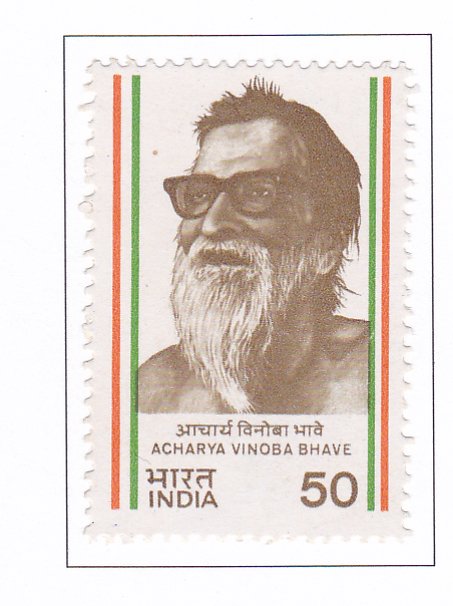Acharya Vinoba Bhave (1895-1982)

Technical Data
| Stamp Set | India's Struggle for Freedom |
|---|---|
| Date of Issue | November 15, 1983 |
| Denomination | 50 p |
| Quantity | 1,500,000 |
| Perforation | comb 13 |
| Printer | Security Printing Press, Nashik |
| Watermark | No Watermark |
| Colors | Multicolor |
| Catalog Codes |
Michel IN 968 Stamp Number IN 1035 Yvert et Tellier IN 780 Stanley Gibbons IN 1093 |
| Themes | Famous people | Freedom Fighters | Independency Activists | Men | Optical Instruments | Reformers |
Acharya Vinoba Bhave Vinayak Narahari Bhave, affectionately known as Vinoba, was born on September 11, 1895, in Ganoda, Maharashtra. Despite being a brilliant student at the Government High School in Baroda, he became disinterested in conventional studies. Instead, he pursued studies in Sanskrit at Banaras and became proficient in Hindu scriptures. Vinoba was a self-taught linguist, mastering multiple languages.
In 1916, Vinoba recognized Mahatma Gandhi as a kindred spirit and adopted him as his spiritual mentor. At Gandhiji’s behest, Vinoba went to Wardha to establish an Ashram, where he lived by Gandhian principles, including truthfulness, non-violence, poverty, and manual labor. He embraced scavenging work and worked tirelessly for social reform.
Vinoba actively participated in various Satyagrahas, including the Nagpur Flag Satyagraha and the Harijan Temple Entry Satyagraha in Guruvayur, Kerala. He also joined the famous Dandi March for Salt Satyagraha in 1930, enduring imprisonment for his activism.
In April 1951, Vinoba initiated the Bhoodan Movement, aiming to address social and economic inequalities peacefully. The movement started with voluntary land donations to be distributed among the landless and later evolved into Gramdan, the voluntary relinquishment of landownership to village communities. Within 15 years, over four million acres of land were collected through Bhoodan, and 18,000 villages were declared Gramdan, fostering a sense of common ownership.
Vinoba envisioned self-sufficiency for every village in food and clothing, advocating for Sarvodaya, the establishment of equality. Following Gandhiji’s example, he established an Ashram at Paunar near Wardha, where he lived until his passing on November 15, 1962.
Vinoba Bhave’s life was dedicated to Gandhian principles and social reform, making him a revered figure in India’s freedom struggle. The Indian Posts and Telegraphs Department is honored to issue a stamp commemorating his legacy and contributions to the nation.
